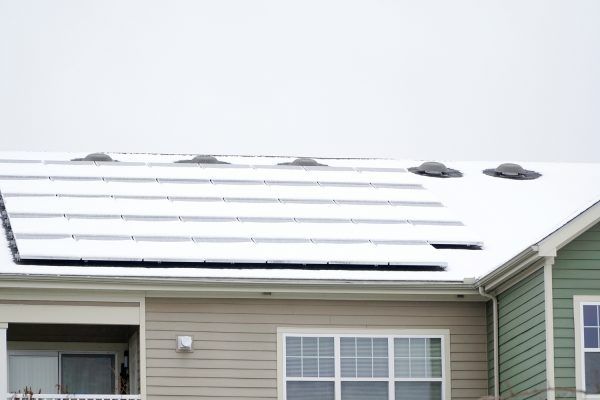Solar Power Generation in Summer vs. Winter
Understanding seasonal variations in solar power production helps owners of solar systems plan for their needs throughout the year.
Solar Power In Colder Months
During the colder months, solar panels generate significantly less energy than they do during the warmer months.
Solar panels produce energy from sunlight.
We’ve installed LightGauges in homes across the country, so we know exactly when the sun rises and sets every day throughout the entire year. Using these dates, we can quantify the annual solar output variations.
- On average, 65 percent of our local solar systems’ annual energy output occurs during the spring and summer months.
- Between September 21 and March 21, accounts for the other one-fifth of annual solar energy production.
If we compare the output from the systems during June and July with the output from the systems between December and January, we can further accentuate any seasonal variations.

Because solar panels produce less energy during winter than they do during summer.
The factors that affect this variation include threefold:
- Longer days- Summers are longer than winters. Therefore, the solar systems will run for longer periods each summer and winter than they would during the spring and fall months.
- The angles of the sunlight – Compounded by the shorter daylight hours in the wintertime, the amount of light reaching the solar panel decreases. Because of this, the amount of electricity produced by the solar panel is reduced. In addition, the wintertime brings about dramatic changes in the position of the earth relative to the moon. During the summer, the earth is closer to the moon and the tides are higher due to gravitational pull. However, during the winter, the earth moves further away from the moon and the tide levels decrease.
- Weather conditions – Not only do the winter months bring plenty of storms, clouds, and heavy snows, but the effects of these factors on the solar panel systems are significant too. With a thin layer of accumulated ice, the panel will often still be able to operate, but larger amounts of accumulation can prevent the panel from turning on and producing any electricity for several days.
Will lessened solar production during winter increase energy bills?
So how does this affect your utility bill? It won’t necessarily increase your bill if your solar panels produce more energy than you use during the day. However, if you’re using less power at night because you’ve gone to bed earlier, then you may be able to offset some of your costs by selling excess energy back to the grid.
We size solar systems based on the total annual electricity use, so we can ensure that there’s enough power available throughout the year. If you’re located in an area where the sun shines most of the time, then you may want to consider installing a smaller solar panel array than if you live somewhere else.
Does solar power work on cloudy days?
The assumption that solar power cannot function when clouds obscure sunlight is false. In fact, solar power does function during periods of heavy cloud cover. However, the output of a solar panel may drop significantly during these times. Fortunately, many states offer incentives for homeowners who install solar power systems. These include tax credits, rebates, and low interest loans. Net metered systems allow customers to sell excess electricity back into the grid. This means they get paid for any extra electricity they send back to the utility company. Customers also receive credit for any electricity they consume beyond what they actually use.
What We Advise
This is also why, for our customers who get their systems interconnected in months other than March and April, we advise them to utilize their utility’s “Anniversary Date Change” process to make sure that they are optimizing the use of their net-metered energy credits over the course of the year. If you’d like to learn more about optimizing your anniversary date please call Syntek Solar and speak with one of our Technical Sales Engineer
